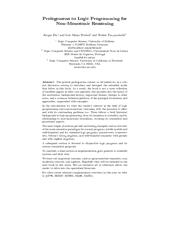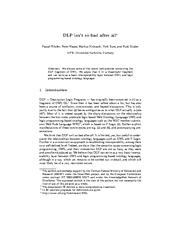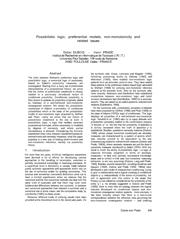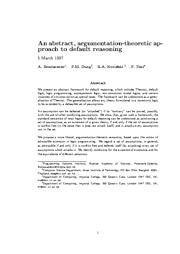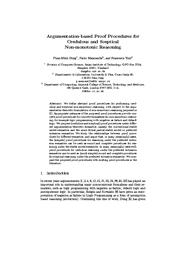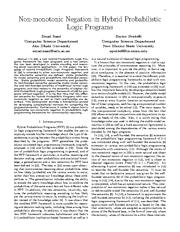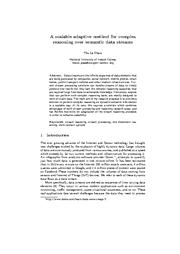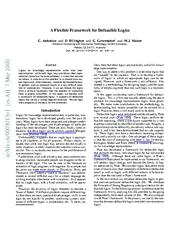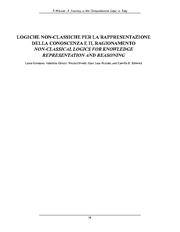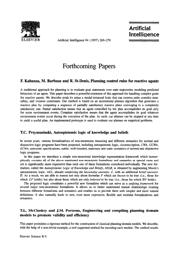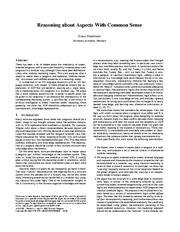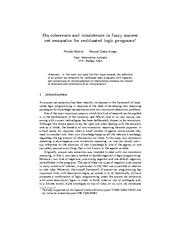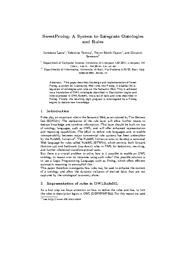A copy of this work was available on the public web and has been preserved in the Wayback Machine. The capture dates from 2019; you can also visit the original URL.
The file type is application/pdf.
Filters
Prolegomena to logic programming for non-monotonic reasoning
[chapter]
1997
Lecture Notes in Computer Science
In the introduction we whet the reader's interest in the eld of logic programming and non{monotonic reasoning with the promises it o ers and with its outstanding problems too. ...
There follows a brief historical background to logic programming, from its inception to actuality, and its relationship to non{monotonic formalisms, stressing its semantical and procedural aspects. ...
Lu s Moniz Pereira acknowledges also the support of JNICT/PRAXIS and its funding of the project MENTAL (#2/2.1/TIT/1593/95). ...
doi:10.1007/bfb0023799
fatcat:cv52p4si5reb7nvbrgiom52rga
DLP Is Not So Bad After All
2005
W3C Web Ontology Language (OWL) Experiences and Directions Workshop (OWLED)
We argue that it is a meaningful fragment and can serve as a basic interoperability layer between OWL and logic programming-based ontology languages. ...
The authors acknowledge support by the German Federal Ministry of Education and Research (BMBF) under the SmartWeb project, and by the European Commission under contract IST-2003-506826 SEKT and under ...
Admittedly, the study of the exact relationships between non-monotonic semantics and first-order predicate logic semantics has been neglected in the past, and consequently the relations are not well understood ...
dblp:conf/owled/HitzlerHKSS05
fatcat:zviatwmxuvh23og4u7gjnwtzyu
Possibilistic Logic, Preferential Models, Non-monotonicity and Related Issues
1991
International Joint Conference on Artificial Intelligence
We obtain the possibilistic counterpart of Adams' e-semantics of conditional probabilities which is the basis of the probabilistic model of non-monotonic logic proposed by Geffner and Pearl. ...
Considering the formerly established close links between Gardenfors'epistemic entrenchment and necessity measures, what this paper proposes is a new way of relating belief revision and non-monotonic inference ...
This work has been partially supported by the European ESPRIT Basic Research Action n° 3085 entitled "Defeasible Reasoning and Uncertainty Management Systems (DRUMS)''. ...
dblp:conf/ijcai/DuboisP91
fatcat:fcu7srqa6zfqhbex7le7366p6e
An abstract, argumentation-theoretic approach to default reasoning
1997
Artificial Intelligence
We present an abstract framework for default reasoning, which includes Theorist, default logic, logic programming, autoepistemic logic, non-monotonic modal logics, and certain instances of circumscription ...
We propose a more liberal, argumentation-theoretic semantics, based upon the notion of admissible extension in logic programming. ...
The authors are grateful to Murray Shanahan for helpful discussions, and to Victor Marek and the referees for helpful comments. ...
doi:10.1016/s0004-3702(97)00015-5
fatcat:ortnjqdjqzhkhl5rsnqgbs3tqe
Argumentation-Based Proof Procedures for Credulous and Sceptical Non-monotonic Reasoning
[chapter]
2002
Lecture Notes in Computer Science
Appropriate instances of the proposed proof procedures provide concrete proof procedures for concrete formalisms for non-monotonic reasoning, for example logic programming with negation as failure and ...
We study the relationships between proof procedures for different semantics, and argue that, in many meaningful cases, the (simpler) proof procedures for reasoning under the preferred extension semantics ...
The third author has been supported by the UK EPSRC project "Logic-based multi-agent systems". ...
doi:10.1007/3-540-45632-5_12
fatcat:bzvvhe3xefawzafyet453f7bni
Non-monotonic Negation in Hybrid Probabilistic Logic Programs
2006
International Symposium on Artificial Intelligence and Mathematics
In this paper, the language of Hybrid Probabilistic Logic Programs framework of [23] is extended to allow non-monotonic negation, and two alternative semantics are defined: stable probabilistic model semantics ...
Furthermore, it makes it clearer how to characterize non-monotonic negation in probabilistic logic programming frameworks for commonsense reasoning. ...
Moreover, we showed that the relationship between the probabilistic well-founded semantics and the stable probabilistic model semantics preserves the relationship between the well-founded semantics and ...
dblp:conf/isaim/SaadP06
fatcat:a6js7mw6rnhc7f53vlddtn2d4u
A Scalable Adaptive Method for Complex Reasoning Over Semantic Data Streams
[chapter]
2015
Lecture Notes in Computer Science
The main aim of my research proposal is to provide a solution to perform complex reasoning on dynamic semantic information in a scalable way. ...
At its core, this requires a solution which combines advantages of both stream processing and reasoning research areas, and has flexible heuristics for adaptation of the stream reasoning processes in order ...
Moreover, MCS are capable of integrating "typical" monotonic knowledge representation logics like description logics or temporal logics, and non-monotonic logics like default logic and ASP. ...
doi:10.1007/978-3-319-18818-8_48
fatcat:6kmbh4q3qzhhhatj5kpd5pjqzy
Non Deterministic Logic Programs
[article]
2013
arXiv
pre-print
The language of non deterministic logic programs framework is extended with non-monotonic negation, and two alternative semantics are defined: the stable non deterministic model semantics and the well-founded ...
We present a logic programming framework called non deterministic logic programs, along with a declarative semantics and fixpoint semantics, to allow representing and reasoning about inherently non deterministic ...
We show that the relationship between the well-founded non deterministic model semantics and the stable non deterministic model semantics for normal non deterministic logic programs preserves the relationship ...
arXiv:1304.7168v1
fatcat:sfcljxdfgzf4hgp4kwtxbiaw5e
A flexible framework for defeasible logics
[article]
2000
arXiv
pre-print
It supports all defeasible logics that satisfy a strong negation principle. We use logic meta-programs as the basis for the framework. ...
A solution to this problem is to choose from several logics and, when necessary, combine the representations. In general, such an approach results in a very difficult problem of combination. ...
In the process, we clarify the relationship between defeasible logics and other non-monotonic logics.
Defeasible Logics The family of defeasible logics was introduced by Nute. ...
arXiv:cs/0003013v1
fatcat:siq2o6w3brhytmyw4fkpgqy2d4
Non-Classical Logics for Knowledge Representation and Reasoning
2008
Festschrifts: Birthday, In Memory of ...
In particular, we describe our research in the application of non-classical logics to knowledge representation and in the development of proof methods for non-monotonic and conditional logics. ...
We briefly outline our research activity in the field of nonclassical logics started in the 90s. ...
and non-monotonic logics. ...
dblp:conf/birthday/0001GOPS08
fatcat:leoppiuagzfepi6reedkp5af2i
Forthcoming papers
1997
Artificial Intelligence
We describe goals by using a modal temporal logic that can express quite complex time, safety, and lliveness constraints. ...
Complete satisfaction means that the agent accomplishes its goal whatever environment events occur during the execution of the plan. ...
Przymusinski, Autoepistemic logic of knowledge and beliefs In recent years, various formalizations of non-monotonic reasoning and different semantics for normal and disjunctive logic programs have been ...
doi:10.1016/s0004-3702(97)90022-9
fatcat:kwtxpsjqd5gw7idafuw66hz5em
Reasoning about aspects with common sense
2008
Proceedings of the 7th international conference on Aspect-oriented software development - AOSD '08
We argue that a more modular semantics that is easier to reason about can be given to AO programs if we renounce the monotonicity of the corresponding reasoning system -a sacrifice that is well-known in ...
There has been a lot of debate about the modularity of aspectoriented programs, and in particular the ability to reason about such programs in a modular way, although it has never been defined precisely ...
Acknowledgements We thank Todd Milstein, James Noble, the program chair, and the anonymous reviewers for helpful comments. ...
doi:10.1145/1353482.1353489
dblp:conf/aosd/Ostermann08
fatcat:2qpqufmw3fa3jaz5yju3lncbma
Development of a Logic Layer in the Semantic Web: Research Issues
2010
2010 Sixth International Conference on Semantics, Knowledge and Grids
The ontology layer of the semantic web is now mature enough (i.e. standards like RDF, RDFs, OWL, OWL 2) and the next step is to work on a logic layer for the development of advanced reasoning capabilities ...
This paper discusses argumentation, semantic web and defeasible logic programming with their distinct features and identifies the different research issues that need to be addressed in order to realize ...
On other hand, Logic Programming does provide these features to support non-monotonic behavior of the system [20] . ...
doi:10.1109/skg.2010.61
dblp:conf/skg/JanjuaH10
fatcat:ln3pql6ftzhmzf4x6uuq232mwm
On Coherence and Consistence in Fuzzy Answer Set Semantics for Residuated Logic Programs
[chapter]
2009
Lecture Notes in Computer Science
In this work we recall the first steps towards the definition of an answer set semantics for residuated logic programs with negation, and concentrate on the development of relationships between the notions ...
of coherence and consistence of an interpretation. ...
Originally, answer sets semantics was intended to deal with non-monotonic reasoning, in that it provides a method to handle negation in logic programming. ...
doi:10.1007/978-3-642-02282-1_8
fatcat:hgrbkqsep5e4re4irh2op4jbmu
SweetProlog: A System to Integrate Ontologies and Rules
[chapter]
2004
Lecture Notes in Computer Science
Finally, the resulting logic program is interrogated by a Prolog engine to deduce new knowledge. ...
This paper describes the design and implementation of Sweet-Prolog, a system for translating Web rules into Prolog. It enables the integration of ontologies and rules on the Semantic Web. ...
OWL is incapable of representing non-monotonicity as is First Order Logic. By using OWLRuleML we can represent non-monotonicity via Courteous Logic Programs, a subset of RuleML. ...
doi:10.1007/978-3-540-30504-0_15
fatcat:k3uwjp2f3zd3do7kgs6g4qpovi
« Previous
Showing results 1 — 15 out of 15,056 results

